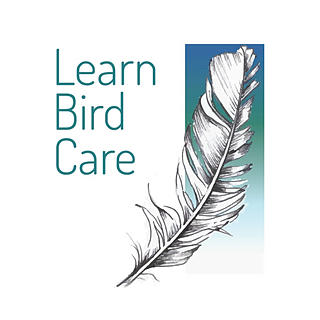Tui rehabilitation in the Springtime
- Learn Bird Care
- Sep 4, 2020
- 3 min read
This week's blog is a guest article from the ARRC - The Animal Rescue and Rehabilitation Centre, Tauranga NZ.

Tui are beautiful native birds that feed largely on the nectar of flowers which is facilitated by their extraordinary long tongues. They also occasionally eat insects and may be seen fluttering around native bush with their lovely call audible. Tui are common residents in Tauranga and are easily identified with their black plumage and distinctive white tuft under their throat. They may fly long distances, especially during winter, to find their favourite foods and they can be very territorial, aggressively chasing other birds away from good food sources. They are also capable of mimicking other bird calls and noises and one of our tui in care was able to mimic the phone ring much to our confusion!
During spring we are inundated with fledgling birds. Baby tui are absolute characters and we thoroughly enjoy nursing these orphans until they are ready for reintroduction into the wild.

Tui are often brought into ARRC needing medical care for a variety of reasons. Sometimes they have broken wings or legs which we are able to set and allow to repair, with rehabilitation they usually make a full recovery and are returned to the wild. Unfortunately, these fractures are occasionally irreparable and these birds are humanely euthanized.

(Learn Bird Care note: tui also frequently come into care in the springtime with Rhododendron toxicity - tui will present with varying levels of paresis, depression and even "screaming" which may be due to pain or distress. Luckily, if caught in time many of these birds can make a full recovery with supportive care such as fluid therapy, feeding +/- pain relief. Not all rhododendrons appear to be as toxic to tui as others, and they will usually succumb if there is no other preferred food around. Unfortunately, some tui will die if not found or treated immediately.)
How you can help tui and other native birds:
Plant and help to conserve native species of plants and forests.
Look after your pet cat responsibly: make sure it’s desexed, has good quality food and doesn’t roam and hunt.
If you have a known rhododendron causing problems in your backyard, you could either remove the tree or provide alternative food sources such as a sugar-water feeder in early Spring until more native flowers start to bloom.
Dr Liza Schneider is the vet and practice manager of Holistic Vets, as well as running the ARRC and they are based in Tauranga, NZ. The ARRC are hugely active in their local community educating people and helping sick and injured wildlife.
If you would like to post a guest blog on our site please contact us at info@learnbirdcare.com.
Would you like to learn more about rescue, first aid and initial care? Wild Bird Rescue 101 covers all these areas so you have the tools and knowledge to help birds in need.
Would you like to know how to rescue and care for Baby Birds from rescue to release? Then Baby Bird Rescue & Care is the course for you!
Learn Bird Care Ltd offers free and paid online training courses for the rescue and rehabilitation of wild birds: https://www.learnbirdcare.com/ . To stay in touch and find out about new blog posts and courses as they are released, register for our free newsletter today and you will also receive our ' Basic Bird Rescue and Initial Care' booklet!






Applying how deep are gas pipes buried uk knowledge ensures safer handling of excavation tasks. The College of Contract Management trains learners to recognise proper depth standards. The course offers useful guidance for preventing installation errors. Many have benefitted from the instruction and improved workplace performance.
Pemain cedera baru kembali ke lapangan lebih cepat dari prediksi medis. napoli vs inter milan
The programme definition in the UK connects education, culture, and communication. It represents structured plans such as university courses or professional training. The College of Contract Management incorporates this understanding into its online programmes, offering courses that are both globally relevant and flexible. Delivered live online, it allows learners to progress at their own pace. It’s the perfect opportunity to invest in your career growth.
https://forums.ipoh.com.my/thread-20224.html
https://www.auseka.com.au/home-services/bothbest
https://bbs.superbuy.com/forum.php?mod=viewthread&tid=725162
https://www.uscgq.com/forum/posts.php?forum=general&id=526199
https://www.uniprep.it/forums/topic/precision-milled-bamboo-flooring-why-quality-matters/
https://haze-growroom.de.tl/Forum/topic-24172-1-Bamboo-Flooring-The-Eco-Friendly-Choice-for-a-S.htm
https://worthitorwoke.com/forum/topic/why-bamboo-flooring-is-the-smart-sustainable-choice-for-eco-conscious-homes/
https://drsridharias.com/forums/discussion/history/bamboo-flooring-a-touch-of-chinas-natural-beauty-underfoot
https://blog.rackons.in/how-bamboo-flooring-contributes-to-leed-points-in-sustainable-building-projects
https://parcheweb.com/forum/general/charlemos-de-nosotras/81939-bamboo-flooring-certifications-fsc-ce-carb
https://www.auseka.com.au/blog/eco-conscious-living-starts-underfoot-why-bamboo-is-the-future-of-flooring
https://my.hiepsiit.com/blogs/70036/Low-VOC-Bamboo-Flooring-Essential-for-Earning-Green-Building-Certifications
https://www.pr4-articles.com/Articles-of-2024/step-step-diy-guide-installing-click-lock-bamboo-flooring-confidence
https://drukarnia.com.ua/articles/low-voc-bamboo-flooring-essential-for-earning-green-building-certifications-Kra3P
https://www.pr5-articles.com/Articles-of-2024/keep-your-bamboo-floors-beautiful-practical-maintenance-tips-lasting-performance
Amazing explanation about importer of record, very clear and useful for companies dealing with international trade.